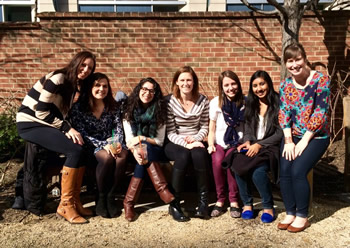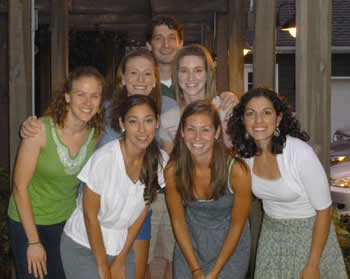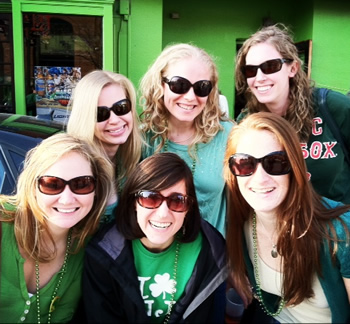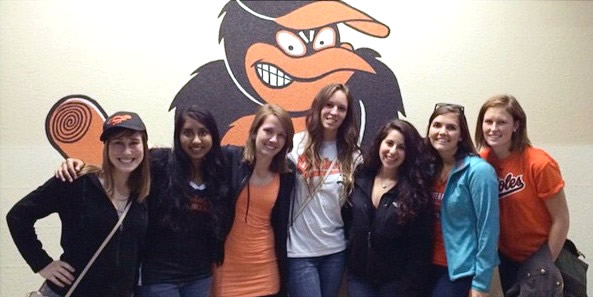Frequently Asked Questions
Program History
When was the program established?
The program was established in 1995. The first class graduated in 1997.

Is the program accredited?
The MGC Program is accredited by the Accreditation Council for Genetic Counseling (ACGC). Graduates of the MGC Program are eligible to sit for the American Board of Genetic Counseling (ABGC) certification examination.
Is the program a part of the UMB School of Medicine?
Yes
Is the program located in its own building or throughout campus?
There is a central genetic counseling suite in which the program director and administrative assistant are located. There are also workstations and computers where students can gather and work, some faculty offices, and a break room located within the suite. Classes are held in the same building or nearby in a connecting building.
What is the atmosphere of the campus?
The University of Maryland, The Founding Campus is an urban campus in the heart of Baltimore that is home to graduate students and professionals. It is separate from the undergraduate college, which is located in College Park, Maryland.
What makes the UMB genetic counseling program unique?
Our program is well known for its excellence in training and clinical opportunities. The program is affiliated with more than 40 sites for clinical rotations within Baltimore, the greater Maryland area, and Washington, D.C. While the students benefit from the large genetic counseling community in Baltimore, the UMB program itself is a small program of 8-10 students. The small number allows close friendships to develop between the students, as well as provides more intimate learning experiences, small group discussions, and one on one time with the faculty and genetic counselor instructors in the program. The program blends scientific learning with psychosocial training for a balanced curriculum. Our students graduate with a wealth of knowledge and readiness to enter the professional genetic counseling world. Most students often have been offered and accepted positions before they even graduate. Additionally, on average the first time test taker pass rate for the board certification exam for the last 5 years is greater than 90%.
Applying to the Program

I've heard about the Genetic Counseling Admissions Match...what is this?
The University of Maryland Genetic Counseling Program is participating in the Genetic Counseling Admissions Match through National Matching Services (NMS) beginning with admissions for Fall 2018. The GC Admissions Match has been established to enhance the process of placing applicants into positions in masters-level genetic counseling programs that are accredited by the Accreditation Council for Genetic Counseling (ACGC). The Match uses a process that takes into account both applicants’ and programs’ preferences. All applicants must first register for the Match with NMS before applying to participating genetic counseling graduate programs. Please visit the website at https://natmatch.com/gcadmissions/
At the conclusion of all program interviews, both applicants and programs will submit ranked lists of preferred placements to NMS according to deadlines posted on the NMS website. The binding results of the Match will be released to both applicants and programs simultaneously in late April.
There are three tracks for the University of Maryland:
12810 - 2-Yr - MGC Program - Scholarship ($10,000 for Year One only)
12811 - 2-Yr - MGC Program - no funding, pay full tuition
12812 - 2-Yr - MGC Warren Alpert Foundation Scholarship
When ranking the University of Maryland MGC Program, please make sure to rank ALL tracks for which you wish to be considered.
How many programs should I apply to?
On average, most successful applicants to genetic counseling training programs apply to five individual programs.
What can I do to strengthen my application for genetic counseling programs?
Prior completion of the pre-requisite courses, seeking out opportunities to observe a genetic counselor, clinical or research background, and counseling experience (such as crisis or hot-line counseling) are all great ways to strengthen your application.
What is the cost to apply to the UMB program?
There is a non-refundable application fee of $80.
What are the application requirements for the UMB program?
To apply to the UMB program, one must submit an on-line application, essay, copy of CV/resume, 3 letters of recommendation, unofficial transcript from each educational institution attended, and application fee.
When is the UMB application deadline?
The application deadline for the MGC Program is in early January. The date may vary from year to year.
How many applications do you typically receive?
We typically receive approximatley 200 applicants for 8-10 training slots.
How many applicants receive an interview?
50 applicants will be invited for an interview.
When will I find out if I have received an interview?
Applicants are typically notified the first week in February if they have been offered an interview.
What does the interview entail?
Applicants will be scheduled for half day of interviews where they will participate in a brief introduction and information session about the MGC Program, meet with 4 faculty members, attend an MGC Student led campus tour and have lunch with many of the current students. Applicants will be scheduled for either the morning or afternoon interview session. The current students in the MGC Program host an informal (non-mandatory) meet and greet the evening before interviews. Interviewees should plan to wear business attire for their interview.
How many students are accepted each year?
The MGC Program typically accepts between 8-10 students for each academic cohort.
What is the average GPA of accepted students?
The typical average class GPA is approximately 3.5
Can I visit the program or speak with the faculty or students before I apply?
We welcome prospective students to contact the program if they'd like to speak or meet with faculty, current students or alumni. Please contact Ann Toma at atoma@som.umaryland.edu to help coordinate this request.
Classes and Rotations

How long is the entire program?
The MGC Program is a full time 21 month continuous enrollment training program. All classes are held on site.
Do classes consist only of genetic counseling students or are they mixed with other graduate students?
The majority of the classes are designed for the genetic counseling program, thus they consist only of the genetic counseling students. There are a number of classes which other PhD or Master’s students from the human genetics program attend, including two human genetics courses and a seminar class. Although not a requirement, students also have the option of taking elective course through any of the graduate studies programs in the UMB campus.
Who teaches the classes?
Classes are taught by a variety of professionals including genetic counselors, geneticists, physicians, and UMD faculty, as well as professionals from other institutions.
What is the class schedule like throughout the program?
The schedule varies depending on which year you are in for your training. The first year of the program is when the majority of classes are scheduled to prepare you to understand the nuances of genetic counseling as well as master content material. In addition to coursework, the students participate in year round in-depth experiential clinical rotations in a variety of settings that reinforce the didactic coursework. 1st year rotations include time in prenatal clinic, cancer clinic, metabolism clinic, cardiovascular clinics, NF and Ataxia clinics, CF clinics, Down syndrome clinic, Kennedy Krieger rotation, cytogenetics, molecular and metabolic lab experiences. The second year is spent in clinical rotations, with just a few scheduled classes.
How much time is spent in classes?
During the first year, 9 classes are scheduled during 3 days of the week. However, some of these classes only meet once per week or even once per year. During the second year, 6 classes are scheduled during 2 days of the week. Some of these classes only meet once per week and some only span one semester.
What are clinical rotations like?
We have many great rotation sites that provide many great clinical opportunities.
During the 1st year, the students spend time in a series of clinical rotations that are designed to provide exposure to various clinics and genetic disorders. These clinics include prenatal clinic, cancer clinic, metabolism clinic, cardiovascular clinics, NF and Ataxia clinics, CF clinics (adult and pediatric), Down syndrome clinic, Kennedy Krieger rotation, cytogenetics, molecular and metabolic lab experiences. In the second year, students complete 3 main rotations (pediatric, prenatal, and cancer) for 12 weeks each and an intensive rotation of their choosing (this is full time 40 hrs/week for four weeks)
Rotations begin in the first year of training and continue throughout the 21 months that students are enrolled.
Students spend approximately 2-3 days per week in clinic.
The ABGC requires students to log a minimum of 50 cases by graduation. Our students end up surpassing this minimum requirement and see more than 50 patients. Students and alumni state that the structure of the rotation experience prepares them to provide quality patient care at all stages of their training.
Is it possible to do a summer rotation elsewhere in order to network in a specific area?
Yes. Students will work with the clinical rotation coordinator if they wish to pursue a summer rotation.
Is there an independent study/research requirement?
Yes. Students spend their first semester learning research methods and developing an idea for an independent study. The second semester focuses on refining specific aims and designing the study instrument. Data collection typically is completed by the fall semester of the second year and students then proceed to data analysis. A submission-ready manuscript is required. Students have faculty advisors and a thesis committee to work with them throughout the entire process and provide mentorship.
Do you need a car?
It is not required, but it is encouraged. There are a number of rotation sites outside of the Baltimore City area and a car will be helpful for that purpose. Parking garages are located on campus and passes are available for purchase.
Finance
How much is tuition?
Tuition will vary depending on whether or not you are a Maryland state resident. Insurance is also a factor, i.e., if you need to purchase your own insurance or if you are still covered under your parents' policy. These costs also vary by year. For the most recent tuition and fees, click here: http://www.umaryland.edu/media/umb/af/sa/mgc.pdf. If this link does not work, please visit Financial Services (www.umaryland.edu/financialservices/), scroll down to Student Accounting, and click on the link for "Tuition and Fees."
Is financial aid available?
Yes, students can apply for federally funded financial aid. Please visit Student Accounting for more information. You can also contact the office of Student Financial Assistance and Education by phone (410-706-7347) or email (aidtalk@umaryland.edu)
What additional fees can I expect?
Students are given a list of recommended texts at the beginning of their first year. This list includes all of the books that will/may be used throughout the entirety of the program. Not all books are required and many students often purchase used copies at a reduced price. Other campus related fees are factored into the tuition and all students are required to have health insurance (either through the university or private coverage). If you need to drive and park on campus, you will have to pay a fee for parking.
Is work study available?
Yes. UMB has a work study program and students may apply. Work study is optional.
Is it possible to work part time during the program?
Being in the GC training program means you are a full-time student. However, it is possible to work part time while in school. Students typically work 10 hours per week during school. Working part time (either through the work study program or an outside job) is not required.
How much do students typically spend on housing?
This really depends! Costs will vary depending on the type of housing (apartment vs. condo vs. house) and the living situation (living alone or with one or more roommates).
Baltimore Life
Is public transportation available?
Yes. Baltimore has many options including buses, the Metro (Baltimore subway system), the Light Rail (aboveground train), and the Charm City Circulator (free bus that loops within Baltimore city). There is also a free UM shuttle that is available to UMB students and staff. You must show a UMB ID to board.
Are there fun things to do in Baltimore?
Yes! Baltimore is home to the beautiful Inner Harbor, where residents and visitors alike can visit, dine, and shop! There are many restaurants, small shops, and a mall located in and around the Inner Harbor. If you want something more than shopping and snacking, there are also many museums within a small radius of the Inner Harbor. Nearby attractions include the Maryland Science Center, American Visionary Art Museum, the Port Discovery Children’s Museum, the Reginald F. Lewis Museum of Maryland African American History & Culture, and the Babe Ruth Museum, to name just a few. There are also a variety of different cruises one can take in the harbor, even a Pirate Cruise! Fells Point and Federal Hill are also fun Baltimore neighborhoods that offer a lot in terms of dining, nightlife, and history. We are also located close to other great cities, such as Philadelphia, Arlington, and Washington, D.C..
Is there shopping nearby?
Yes, there are grocery stores in Fells Point and Canton that can be reached by public transportation or by car. There are additional grocery stores that are located outside of the Baltimore city limits which are more easily accessible by car.
Is it safe to live in Baltimore?
Yes. As with all major cities, awareness of your surroundings is important. UMB has its own police force that is dedicated to keeping the campus safe. Emergency call buttons are located on streets throughout the campus. They even offer vehicle and walking escort services to all students, faculty, and staff.
Where do students live?
Students may choose to live wherever they wish. They often live in and around the city to be close to campus. There are many options available, such as apartments, condos, and houses. We also offer a Welcome to Baltimore Day during the summer when students can come and see apartment complexes that are commonly rented by students in past years. This is a great way to help with home searching and start to get to know your classmates.
Are there opportunities to meet students outside of the genetic counseling program?
Yes! In addition to some of the classes that are taken with other human genetics students, there are many fun opportunities to meet and mingle with other UMB students. The Student Government Association and Graduate Student Association regularly hold fun events, such as the Welcome Back to School Social, Crab Feast, Fall Formal, holiday socials, and outings to Orioles’ games!
About Genetic Counseling
What is genetic counseling?
The National Society of Genetic Counselors (NSGC) defines genetic counseling as the process of helping people understand and adapt to the medical, psychological, and familial implications of genetic contributions to disease. This process integrates:
- Interpretation of family and medical histories to assess the chance of disease occurrence or recurrence
- Education about inheritance, testing, management, prevention, resources, and research
- Counseling to promote informed choices and adaption to the risk or condition
Visit www.nsgc.org for more information.
Who are genetic counselors?
Genetic counselors are health care professionals who specialize in medical genetics and counseling. They work as members of a health care team to provide care, support, and information to family members dealing with a variety of genetic health issues, such as birth defects, known genetic disorders, and increased risk for inherited conditions. They provide supportive counseling to families, serve as patient advocates, educate and act as a resource for patients, the public, and other health care professionals.
Where do genetic counselors work?
Genetic counselors can work in nearly all areas of healthcare, e.g. hospitals, academic centers, and private clinics. They can also work in non-traditional settings such as diagnostic laboratories, educational programs, pharmaceutical industry, public health, policy development, and advocacy. These are just a few examples of where genetic counselors can share their knowledge and skillset.
There are also many different clinical specialties available within healthcare. Genetic counselors can specialize in prenatal, pediatric, cancer, cardiovascular, metabolic, psychiatric, and neurogenetics. There are many other sub-specialties within genetics, and some people specialize in more than one area.
What makes a good genetic counselor?
Genetic counselors are drawn to the exciting field of genetics, but also enjoy working with patients and having that personal interaction. They are passionate about the idea of constantly learning new things as science and technology continue to expand our understanding of genetics and medicine, and they are equally as passionate about translating this knowledge in ways that everyone can understand and appreciate. Compassion, empathy, and genuineness are just a few qualities that are important in a genetic counselor.

